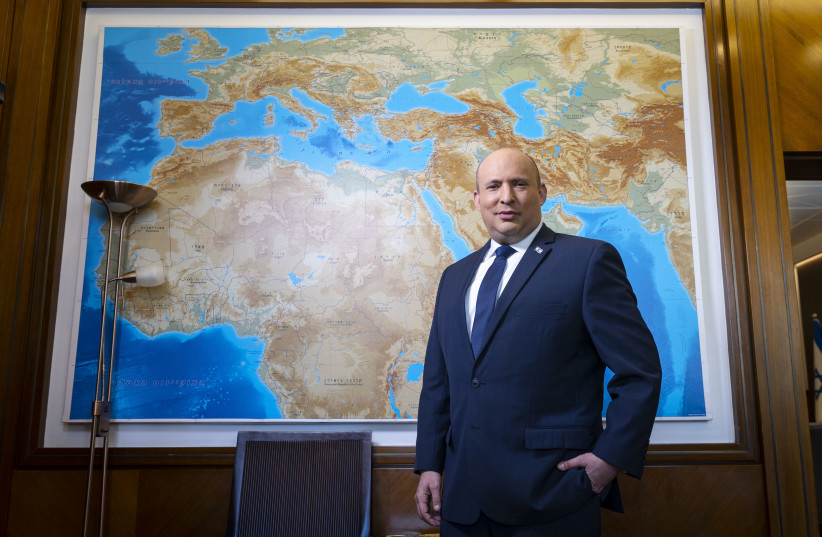Prime Minister Naftali Bennett invited US President Joe Biden to visit Israel in a phone call on Sunday. A few hours earlier, he said the Iran nuclear deal that world powers are negotiating in Vienna will make it harder to stave off a nuclear Iran.
“The leaders discussed regional challenges, foremost of which is growing Iranian aggression and steps to restrain the Iranian nuclear program,” the Prime Minister’s Office said.
Bennett congratulated Biden on the killing of ISIS leader Abu Ibrahim al-Hashimi al-Qurashi last week. The world is a safer place thanks to US forces, he said.
Bennett also thanked Biden for “his personal and his administration’s strong support for Israel, with an emphasis on US aid in funding the Iron Dome.”
They also spoke about the tensions on the Russia-Ukraine border.

Bennett and Biden met for the first time in August at the White House and met again at the UN Climate Change Conference in Glasgow in October. They had not spoken since, but their national security advisers have repeatedly spoken and met in person.
Earlier Sunday, Bennett told the cabinet he was closely following the negotiations with Iran in Vienna to return to the 2015 nuclear deal between world powers and Iran. Biden has promised to return to that deal.
“The agreement and what appear to be its conditions will damage the ability to take on the nuclear program,” Bennett said.
“Whoever thinks an agreement will increase stability is wrong,” he added. “It will temporarily delay enrichment, but all of us in the region will pay a heavy, disproportionate price for it.”
In recent weeks, Iran has been upping its aggression in the region while it negotiated in Vienna, Bennett said.
Israel is working to strengthen itself militarily for the coming decades, he said, adding: “Israel will maintain freedom of action in any situation, with or without an agreement.”
World powers have been negotiating on and off with Iran for the past 10 months for the Islamic Republic and the US to return to compliance with the 2015 Joint Comprehensive Plan of Action. That nuclear deal restricted Iran’s uranium enrichment, but not its ballistic-missile program or funding of proxy militias, until 2030, along with the gradual lifting of sanctions.
The US left the deal and placed heavy sanctions on Iran in 2018 due to its malign actions in the region and evidence that its nuclear program was a weapons program, contrary to Tehran’s denials. The evidence was found in an archive smuggled out by the Mossad.
Israeli officials are concerned that the renewed deal with Iran will maintain the regime’s time to nuclear breakout at less than six months. One of the flagship goals of the JCPOA in 2015 was to keep Iran a year away from nuclear breakout.
The breakout time in a new deal would be shorter than the original JCPOA, US Special Envoy for Iran Rob Malley admitted in an interview with MSNBC over the weekend.
“Because of the advances that they’ve made over the years since we withdrew from the deal... it’s going to be hard to recapture the full nonproliferation benefits, the full breakout timeline,” he said. “That’s obviously one of the many catastrophic consequences of the decision to leave the deal.”
Iran’s current breakout time, without any deal, is weeks away, and a deal would extend that timeline, Malley said.
“We have differences with Israel, but we are working hand in glove with them to make sure our common interests are defined,” he said.
Israeli officials are also concerned the Biden administration might waive sanctions for other countries to provide enriched uranium for the Tehran research reactor, convert its Arak heavy-water research reactor and send spent and scrapped reactor fuel abroad.
These measures would allow “disposition of stockpiles and other activities of nonproliferation value,” the State Department said, adding that the waivers are not a concession to Iran.
